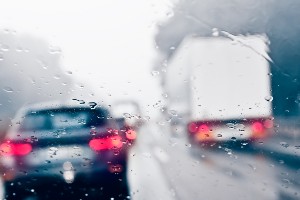
Florida gets plenty of rain throughout the year. However, when the roads are wet and slick, it can make driving more dangerous. Heavy rain can lower visibility on the road and increase the risk of a crash.
In inclement weather, drivers could be held liable for damages in a crash. Drivers have a responsibility to operate their vehicles safely in all situations, including heavy rain. They must slow down, leave more distance between their vehicle and the vehicle in front of them, turn on their headlights and more.
If you have been seriously injured in a rain-related crash, you may be eligible to pursue compensation. Learn more about your rights during a free initial consultation. Should you have a case and we represent you, we are ready to assess liability for your damages. There are zero upfront fees involved.
Why Driving in the Rain Is So Dangerous
The likelihood of a crash happening goes up when it is raining outside. Rain is a factor in tens of thousands of crashes each year resulting in significant injuries and fatalities.
Slippery Roads
Rainy conditions can cause the roads to be slick and slippery. Drivers may not realize how rain can impact a vehicle’s braking system. Brakes rely on friction to slow a vehicle down or bring it to a stop. When the roads are wet, there is less friction between a vehicle’s tires and the road.
Braking too hard in the rain can cause a vehicle’s tires to lock up and lose traction on the road. Drivers can skid and lose control of their vehicles and crash. Driving too fast in rainy conditions can also cause hydroplaning. This happens when a vehicle’s tires loses contact with the road and slides over a layer of water on the road.
Low Visibility
Driving in the rain reduces a driver’s visibility, which can also be very dangerous. Heavy rain can obstruct a driver’s field of view, making it difficult to see the road ahead of him or her. Drivers may be unable to discern how close other vehicles and moving objects are and make braking more difficult.
Inexperienced Drivers
Not all drivers know how to operate their vehicles safely in rainy conditions. Inexperienced drivers may become timid and afraid and end up driving at unreasonably slow speeds. Someone driving too slow in heavy rain can actually increase the risk of another vehicle hitting them.
Other times, drivers may overestimate their own abilities in inclement weather. They may be more reckless and decide to speed even when visibility is low and the roads are slippery. Doing so can greatly endanger the driver’s life, his or her passengers and the lives of those around them.
Assessing Liability for a Rain-Related Crash
A driver can be liable for a crash even if it happened due to heavy rain. Drivers still have a duty of care to ensure that they are driving safely and responsibly to avoid harm to others sharing the road.
As a result of that duty of care, if a driver’s negligence led to a rain-related crash, he or she could be held accountable in a lawsuit.
Negligence, in this case, is the failure to exercise reasonable care while driving. Reasonable care is defined as how a reasonable person would have driven under the same or similar circumstances.
For instance, say a driver was following too closely behind another vehicle in heavy rain. He or she fails to slow down when approaching a red light and strikes the other vehicle from behind. The driver who rear-ended the vehicle will likely be considered negligent. A reasonable person driving in the rain would not have tailgated another vehicle understanding the risk of a crash associated with such behavior.
Aside from driver negligence, some rain-related crashes can also be caused by vehicle defects (i.e. faulty brakes, tires, windshield wipers and headlights). If a defective vehicle part caused you to hydroplane and get injured, you may be able to hold the manufacturer of the vehicle or its parts liable for your damages.
How to Drive Safely in Heavy Rain
In rainy conditions, always give yourself plenty of time to get to your destination. Do not rush and use extra caution – especially in heavy rain – as a crash is more likely in happen when conditions are poor.
- Be sure to slow down – Going too slow can cause more harm than good. However, it is still important to slow down and do not use cruise control when driving in the rain.
- Do not brake suddenly – Any sudden or unexpected braking can cause skidding and a loss of control of your vehicle. Ease your foot off the gas pedal and brake gently at a stop sign or light.
- Turn on your headlights – Florida law requires drivers to turn on their headlights any time it rains to increase visibility.
- Keep your distance – Keep a safe following distance of six seconds from other vehicles.
- Pull over and wait it out – You can always pull over to the side of the road if you feel uncomfortable driving in the rain or if there is nearly zero visibility in front of you.
Unsure if You Have a Case? Call Our Firm
If you have been injured by a negligent driver in heavy rain, you may be able to recover compensation to help cover medical bills for treatment, lost wages from missing work and other related expenses.
Our vehicle collision attorneys in West Palm Beach are committed to protecting the rights of injured crash victims and are ready to guide you throughout the entire legal process. Find out if you may have a case by reaching out to our office and scheduling a risk-free, zero-obligation consultation.

 1-855-722-2552
1-855-722-2552